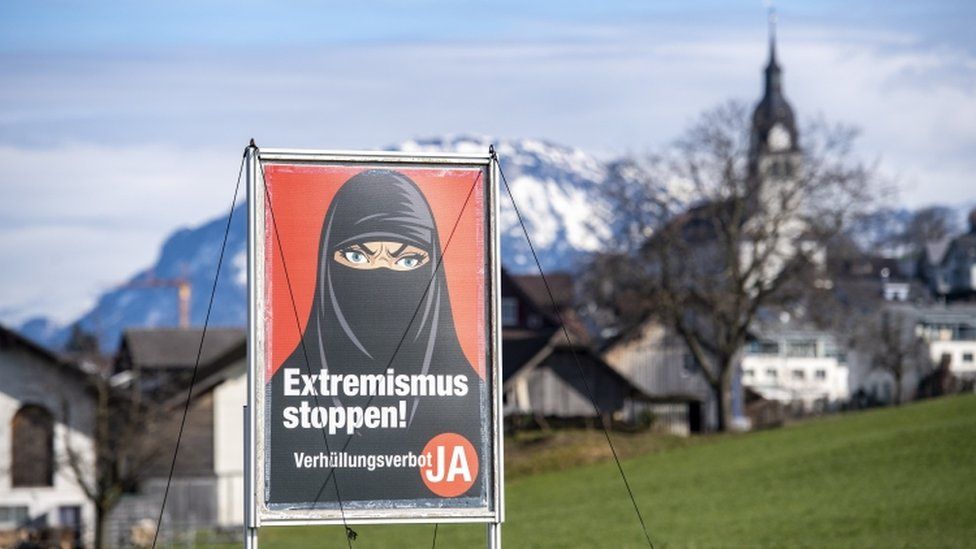
A postura da Suíça frente ao aumento de imigrantes muçulmanos em seu território vem sendo cada vez mais atribuída como conservadora ou reacionária, por demonstrar gradativamente maiores tendências nacionalistas com relação à chegada de novas etnias. A crescente entrada de muçulmanos no país trouxe como reação movimentos contrários ao estabelecimento e prática de culturas advindas do Oriente Médio por parte do Estado suíço.
O país, cuja história contemporânea é marcada pela imigração e emigração de populações diversas, e por boas relações com seus vizinhos apesar de não ser um membro da UE, tem aproximadamente 20% da população composta por estrangeiros, uma das maiores porcentagens de qualquer país, incluindo refugiados e trabalhadores com residência permanente. Dentre as principais motivações para a relutância da livre circulação de estrangeiros advindos de países que não compreendem Espaço Schengen, estão o aumento do índice de criminalidade, de ataques terroristas na última década, a queda na oferta de empregos para nativos e a insegurança econômica diante da pandemia. Tais fatores ajudam a inflamar sentimentos anti-imigração em grupos nacionalistas, sendo importante ressaltar que, uma das causas para as grandes quantidades de imigrantes é a necessidade de mão de obra qualificada por empresas suíças.
Embora uma crise humanitária ou econômica não seja iminente, o governo suíço justifica suas preocupações frente ao aumento de muçulmanos nesses três pilares. Ademais, embora possua uma grande porcentagem de habitantes estrangeiros, a Suíça não se considera um país de imigrantes, demonstrando que a preocupação com a população nativa de seu governo atual sobressai interesses ou ideais que buscam acolher pessoas de diferentes países e etnias.
Perante ações recentes tomadas pelo Estado Suíço acerca da população muçulmana e a manifestação de sua respectiva cultura em território suíço, tal como a recente lei que regulamentou a proibição do uso da burca, por alguns cantões suíços, é possível inferir que existe uma tendência ao conservadorismo étnico e religioso cada vez mais presente. Um exemplo disso, é o fato de que o último referendo que contesta a utilização do acessório religioso, obteve uma pequena maioria de 51,2% da população contra seu uso, com 20 dos 26 cantões aprovando o seu banimento. Sendo assim, a Suíça, embora muito conhecida por políticas a favor de movimentos de livre circulação de pessoas e mercadorias entre países da União Europeia, apesar de cotas de imigração restritivas, está se mostrando cada vez mais fechada à possibilidade de receber novos imigrantes advindos de países muçulmanos, bem como de propiciar condições seguras a eles nos quesitos de empregabilidade, e tolerância no âmbito religioso.
Por fim, chega-se à conclusão de que as políticas restritivas com relação ao aumento da imigração muçulmana tendem a crescer, devido aos conflitos constantes no Oriente Médio e o atual governo de direita Suíço. Porém, a longo prazo, a Suíça poderá enfrentar mudanças em seu sistema social e econômico perante o aumento de muçulmanos no país.
Referências
SALVATORE, Di Nossi. KEYSTONE (org).Um terço dos suíços afirma se sentir “incomodado” por pessoas de outras culturas. Swissinfo.ch. 25 de março de 2021.
Disponível em: https://www.swissinfo.ch/por/um-ter%C3%A7o-dos-su%C3%AD%C3%A7os-afirma-se-sentir–incomodado–por-pessoas-de-outras-culturas/46479404
Último Acesso em: 11 de abril de 2021
GROSS, Dominique M. “Immigration Policy and Foreign Population in Switzerland”. Simon Fraser University. World Bank Policy Research Working Paper 3853, Fevereiro 2006. Disponível: http://documents1.worldbank.org/curated/en/667411468117870996/pdf/wps3853.pdf
Último Acesso em: 12 de Abril de 2021.
IOM (org).Overview: Migration Activities in Switzerland, Setembro de 2012 Disponível: https://www.iom.int/countries/switzerland Último Acesso: 12 de Abril de 2021
BBC News (org). Switzerland referendum: Voters reject end to free movement with EU. 27 de setembro de 2020. Disponível em:https://www.bbc.com/news/world-europe-54316316 Ultimo Acesso em: 13 de Abril de 2021.
OLTERMANN, Philip. Switzerland to ban wearing of burqa and niqab in public places. The Guardian. 7 de março de 2021. Berlin. Disponível em:
https://www.theguardian.com/world/2021/mar/07/switzerland-on-course-to-ban-wearing-of-burqa-and-niqab-in-public-places Ùltimo Acesso em: 13 de Abril 2021
JONES, Dustin. Switzerland Approves ‘Burqa Ban’ To Prohibit Some Face Coverings In Public. National Public Radio. 7 de março de 2021. Disponível em: https://www.npr.org/2021/03/07/974630640/switzerland-approves-ban-on-face-coverings-in-public Último Acesso em: 13 de Abril de 2021
REVILL, John. MORSE, Andrew. Calls to Curb Muslim Immigration Rise in Switzerland. Wall Street Journal. 12 de janeiro de 2015. Disponível em: https://www.wsj.com/articles/calls-to-curb-muslim-immigration-rise-in-switzerland-1421076810 Último Acesso em: 14 de Abril de 2021
Autores Thomas Bauer Corsaro e Priscila Cesarino, pesquisadores do NENE/ESPM
O Núcleo de Estudos e Negócios Europeus (NENE) está ligado ao Centro Brasileiro de Estudos de Negócios Internacionais & Diplomacia Corporativa (CBENI) da ESPM-SP. Foi criado considerando a necessidade de estimular a comunidade acadêmica brasileira e latino-americana a compreender melhor suas relações com os europeus, buscando compreender e aprofundar a Parceria Estratégica Brasil – União Europeia.
